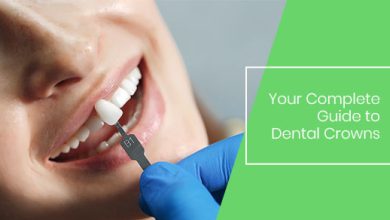Are Dental Crowns Considered Cosmetic? Unveiling the Aesthetic Side
Dental crowns are considered both restorative and cosmetic dental procedures. They improve the function and aesthetics of damaged or decayed teeth.
Intro: Dental crowns are a common treatment used to restore and improve the appearance of damaged or decayed teeth. These versatile dental appliances offer both restorative and cosmetic benefits. Dental crowns not only restore the function and strength of a compromised tooth but also enhance its appearance, making it a popular choice for individuals seeking to improve their smile.
This article will explore the considerations and benefits of dental crowns, addressing the question of whether they are considered cosmetic. We will delve into the various uses of dental crowns, their benefits, and how they contribute to both oral health and aesthetics. Whether you are facing tooth decay, damage, or gaps in your smile, dental crowns may provide an ideal solution. Let’s examine their cosmetic and restorative aspects in greater detail.
The Growing Demand For Dental Crowns
The demand for dental crowns is growing rapidly as they are considered a reliable solution for tooth restoration. Dental crowns not only help in enhancing the appearance of your teeth, but also restore their functionality. They can effectively restore teeth that are decayed, fractured, or severely damaged due to trauma or other dental issues.
One of the significant benefits of dental crowns is their ability to restore both the aesthetics and functionality of your teeth. They are tailor-made to match the natural color, shape, and size of your existing teeth, ensuring a seamless blend with your smile. Dental crowns provide a long-lasting solution, offering durability and stability, allowing you to chew, speak, and smile with confidence.
Aesthetic considerations play a vital role in dental treatments. Dental crowns are designed to mimic the natural appearance of teeth, ensuring a pleasing aesthetic outcome. They can significantly improve the overall appearance of your smile, boosting your self-confidence and self-esteem.
In conclusion, dental crowns are not just considered cosmetic, but are also an essential component of restorative dentistry. Their ability to restore both form and function makes them highly sought-after by individuals looking to enhance their oral health and appearance.
Understanding Dental Crowns: Aesthetics Vs. Functionality
Dental crowns can play a significant role in both the cosmetic and functional aspects of dentistry. They are commonly used to restore and enhance the appearance of damaged or discolored teeth. Dental crowns are designed to resemble natural teeth and can improve the overall aesthetics of a smile, providing a more confident and attractive appearance.
These custom-made prosthetic devices are placed over existing teeth to restore their shape, size, and strength. This not only improves the appearance of the teeth but also helps in restoring their functionality. Dental crowns can effectively cover and protect teeth that have undergone significant decay, fractures, or root canal treatment.
In cosmetic dentistry, dental crowns are often used to enhance the appearance of misshapen or poorly aligned teeth. They can also be utilized to close gaps between teeth or to change the color and shape of teeth for a more symmetrical and harmonious smile.
In summary, dental crowns serve a dual purpose of both restoring functionality and enhancing the aesthetic aspect of teeth. They are a versatile and effective solution for a variety of dental concerns.
Are Dental Crowns Considered Cosmetic?
Many people have the misconception that dental crowns are purely cosmetic in nature. However, this is not entirely accurate. While dental crowns are often used for restorative purposes, they can also have cosmetic benefits.
A dental crown is a custom-made cap that fits over a damaged or decayed tooth, restoring its shape, size, strength, and appearance. While the primary function of a dental crown is to restore the functionality of a tooth, it also plays a crucial role in enhancing its aesthetic appeal.
With advancements in dental technology, dental crowns can now be made from a variety of materials, including porcelain, ceramic, and zirconia. These materials mimic the natural appearance of teeth and can be color-matched to blend seamlessly with the surrounding teeth. As a result, dental crowns can play a significant role in improving the overall appearance of a person’s smile.
So, while dental crowns are primarily used for restorative purposes, they can also have cosmetic benefits, helping individuals achieve a healthier and more attractive smile.

Credit: www.gilbertarizonadental.com
The Aesthetic Benefits Of Dental Crowns
htmlDental crowns offer numerous aesthetic benefits, effectively restoring the shape and size of a tooth. Whether due to decay, trauma, or wear and tear, teeth can become damaged or worn down over time. Dental crowns provide a solution by covering the entire visible portion of the tooth, restoring its natural shape and size. The crown is custom-made to fit harmoniously with the surrounding teeth, enhancing the overall aesthetics of the smile.
Dental crowns can also address tooth discoloration, whether due to aging, stains, or previous dental procedures. By placing a dental crown over a discolored tooth, a brighter, more uniform smile can be achieved. The crown is matched to blend seamlessly with the natural color of the adjacent teeth, improving overall smile aesthetics.
In cases where a patient has irregularly shaped or misaligned teeth, dental crowns can help improve tooth alignment and symmetry. By placing crowns on misaligned teeth or reshaping them, the dentist can create a straighter and more harmonious smile. This aesthetic improvement can boost confidence and contribute to a healthier self-image.
Dental Crowns: The Art Of Mimicking Natural Teeth
Dental crowns are a common dental restoration that can serve both functional and cosmetic purposes. They are used to restore a tooth’s shape, size, strength, and improve its appearance. While dental crowns can certainly enhance the aesthetics of a smile, they are not solely considered cosmetic.
Materials Used In Creating Dental Crowns
Dental crowns are made from a variety of materials, each with its own advantages and considerations. Some of the popular choices include:
| Metal-based crowns | These crowns, usually made of gold or silver alloy, are known for their durability and strength. |
| Porcelain-fused-to-metal crowns | These crowns provide a natural appearance as they mimic the translucency and color of natural teeth. |
| Ceramic or all-porcelain crowns | Ceramic or all-porcelain crowns are the most aesthetically pleasing as they closely resemble the color and texture of natural teeth. |
Techniques Employed For A Natural-looking Appearance
To achieve a natural-looking appearance, dental professionals employ various techniques, including:
- Color matching: Using shade guides to select a crown color that closely matches the patient’s natural teeth.
- Customization: Shaping and contouring the dental crown to blend seamlessly with the surrounding teeth.
- Layering: Applying different layers of porcelain or ceramic to replicate the natural variations found in tooth enamel.
- Surface texture: Creating realistic surface texture by adding small imperfections and irregularities to the crown’s surface.
Ultimately, dental crowns not only restore the functionality of teeth but also contribute to a natural and attractive smile. Consulting with a skilled dentist can help determine the most suitable material and technique for achieving desired results.
The Role Of Dental Professionals: Ensuring Aesthetic Excellence
Are Dental Crowns Considered Cosmetic?
The Role of Dental Professionals: Ensuring Aesthetic Excellence
Importance of consultation and communication
Finding a skilled cosmetic dentist for dental crown procedures is essential to achieve the desired aesthetic outcomes. Dental crowns can serve both aesthetic and functional purposes, addressing concerns such as chipped, decayed, or discolored teeth. A dental professional plays a crucial role in ensuring aesthetic excellence, taking into account the patient’s preferences and expectations.
Consultation and communication are important steps in this process. During a consultation, the dentist examines the patient’s oral health, discusses the available options, and clarifies the potential outcomes of the dental crown procedure. Through open and transparent communication, the dentist establishes a mutual understanding of the patient’s goals, allowing for a customized treatment plan that meets their expectations.
It is important to remember that dental crowns can have both cosmetic and restorative benefits. While cosmetic improvements aim to enhance the appearance of teeth, restorative aspects focus on functionality and protection. A skilled cosmetic dentist with expertise in dental crown procedures is equipped to offer comprehensive solutions to patients seeking both aesthetic and functional improvements.
Dental Crowns: A Transformative Solution For Smiles
Dental crowns offer a transformative solution for smiles, improving both their appearance and functionality. These tooth-shaped caps are custom-made to fit over damaged, misshapen, or discolored teeth, restoring their natural aesthetics. Real-life patient success stories abound, showcasing the remarkable difference dental crowns can make in transforming smiles, boosting confidence, and enhancing overall well-being.
Beyond their cosmetic benefits, dental crowns also deliver functional advantages. By protecting weakened teeth, crowns provide strength and durability, allowing individuals to bite and chew with ease. They offer a protective barrier against further damage or decay, preventing potential dental complications down the line. Furthermore, dental crowns can help correct bite misalignments, improving overall oral health.
| Benefits of Dental Crowns: |
|---|
| Restores natural appearance |
| Enhances smile aesthetics |
| Improves bite functionality |
| Strengthens weakened teeth |
| Protects against further damage or decay |
| Corrects bite misalignments |
Considering both the cosmetic and functional benefits, dental crowns are a comprehensive solution for individuals seeking to achieve a healthier, more beautiful smile. If you are dealing with tooth imperfections, consult with a dental professional to explore how dental crowns can transform your smile.
Frequently Asked Questions Of Are Dental Crowns Considered Cosmetic?
Is Crown Tooth Cosmetic?
Yes, a crown tooth is a cosmetic treatment option that improves the appearance of a damaged or discolored tooth. It helps restore the tooth’s shape, size, and color, giving it a natural and aesthetically pleasing look.
What Are Dental Crowns Considered?
Dental crowns are considered as protective caps that cover damaged teeth to restore their strength and function. They can also improve the appearance of teeth by enhancing their shape, size, and color. Crowns are a common dental treatment for restoring and enhancing damaged or decayed teeth.
What Type Of Procedure Is A Crown Considered?
A crown is a type of dental procedure that involves placing a cap on a damaged tooth to restore its shape, size, and appearance. It is used to protect and strengthen a tooth that has undergone significant decay or damage due to injury.
Is Root Canal Crown A Cosmetic?
No, a root canal crown is not considered a cosmetic procedure. It is a dental treatment used to restore and protect a damaged or decayed tooth, focusing on its health and functionality rather than aesthetics.
Conclusion
Dental crowns serve both functional and aesthetic purposes, making them a versatile treatment option. While they can enhance the appearance of your smile, their primary goal is to restore damaged or decaying teeth. Whether you need a crown for cosmetic or restorative reasons, consulting with a dental professional is crucial to determine the best course of action for your specific situation.
Trusting in their expertise ensures that you receive the proper treatment to achieve a healthy and beautiful smile.




